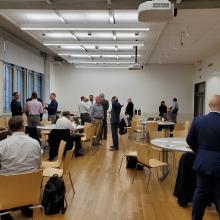Center for Resilient Design convenes stakeholder meeting for the Financing Advanced Microgrids project
On Wednesday, October 16, government staff and energy consultants from across New Jersey convened in the Central King Building to discuss and provide input to a new CRD project focused on community microgrids. The project – funded by the US Department of Energy through the New Jersey Board of Public Utilities – is being led by NJIT’s Center for Resilient Design with support from Rutgers. The goal of the project is to improve the current status of the microgrid development process by identifying and developing procurement guidance that includes funding and financing options suitable for local communities. Ultimately, the project team will develop a local government procurement guide to financing advanced community microgrids that will outline the process that local stakeholders – like the ones who attended the meeting – can use to maximize the economic and resiliency benefits of a microgrid.

Advanced microgrids are more complex than single-site or campus-wide microgrids, as they deliver power to a group of independent facilities, often involving multiple distributed energy resources (DER) and crossing multiple “rights-of-way” (ROW). In New Jersey, these advanced microgrids are known as “Town Center Distributed Energy Resource” microgrids or TCDER microgrids. TCDER microgrids distribute energy at a minimum to a cluster of critical facilities within close proximity within a municipal boundary that are capable of providing essential services and shelter for the public during and after an emergency situation. The New Jersey Board of Public Utilities (NJBPU) is currently evaluating 13 feasibility studies for TCDER
The Financing Advanced Microgrids project has the following objectives:
- Analyze existing best practices to inform the development of the procurement/financing models - best practices may draw from lessons from other industries (e.g., energy-savings performance contracting) if deemed helpful;
- Identify the procurement and financing challenges facing New Jersey’s 13 TCDER applicants.
- Identify and consider alternatives and make recommendations to New Jersey state and local policy makers on how to address the challenges.
- Produce a guide grounded in legal, economic and regulatory realities to help New Jersey and jurisdictions across the United States better understand the process of procuring and financing advanced community microgrids; and
- Define industry-specific terms related to procurement, financing, and the electric sector to ensure the guide is beneficial to local government and other stakeholders.
The guide and training materials delivered at the conclusion of the project will couple guidance on microgrid procurement and financing with general recommendations for state energy offices, as well as state legislation, regulation, and/or policy guidance needed to remove barriers and/or enhance opportunities for the development of advanced microgrids applicable to both states in competitive energy markets and fully vertically integrated utilities.
